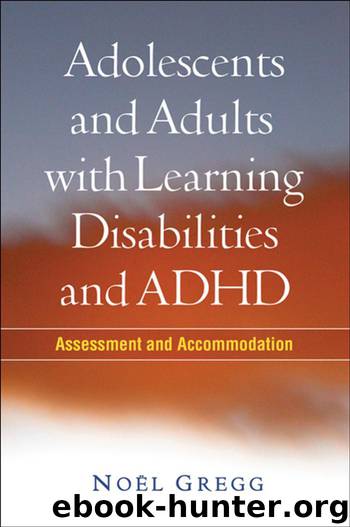Adolescents and Adults with Learning Disabilities and ADHD by Noel Gregg & Donald D. (frw) Deshler

Author:Noel Gregg & Donald D. (frw) Deshler
Language: eng
Format: mobi
Tags: Psychopathology, Special Education, Psychology, Medical, General, Learning Disabilities, Psychiatry, Education, Attention-Deficit Disorder (ADD-ADHD)
ISBN: 9781606230343
Publisher: Guilford Press
Published: 2009-01-01T22:00:00+00:00
Reading Assessment and Accommodation
157
(in press) have identified five major functions of online reading com-
prehension: identifying important questions, locating information,
analyzing information, synthesizing information, and communicating
information.
Several methodologies are currently being used by researchers to
investigate online reading comprehension, including think- alouds (Leu
et al., 2007; Leu & Castek, 2006; New Literacies Research Team, 2007),
curriculum-based measures (Leu et al., 2007), and performance-based
measures (Coiro, 2006; Leu & Reinking, 2005; New Literacies Research
Team, 2007). Leu and colleagues (2008) encourage professionals to uti-
lize multiple- choice and short- answer measures to assess online reading
comprehension, as they are more time- efficient but still valid alterna-
tives for evaluating a reader’s abilities. One such instrument, the Digital
Divide Measurement Scale for Students (DDMS-S; Henry, 2007), is a
14-item forced- response measure developed to assess reading to locate
and critically evaluate online information. Unfortunately, this measure
is only normed for middle school students. In addition, Leu and col-
leagues have developed a checklist for observing a reader’s abilities to
understand and develop questions for an online search, locate informa-
tion, critically evaluate information found online, synthesize informa-
tion found online, and communicate information found online. Both
the DDMS-S and the Leu and colleagues checklists can guide profes-
sionals in creating either local norms or other measures of online read-
ing comprehension.
Accommodations for
Reading Comprehension Deficits
Underachievement resulting from reading comprehension disorders is
much more difficult to accommodate than that caused by decoding and
reading fluency problems. Read- alouds or extended time alone do not
always effectively accommodate the learning needs of individuals with
LD who are struggling with the meaning of oral or written language.
For adolescents and adults with ADHD whose executive processing
deficits limit their strategic thinking, organization, and revision, such
accommodations may also be limited in their effectiveness. Specific
reading comprehension accommodation options are provided in Table
5.2, based on current reading strategies and technology research. How-
ever, evaluators are encouraged first to answer the questions provided
in Figure 5.5 in determining whether an accommodation for reading
comprehension underachievement would be effective for an adolescent
or adult with LD or ADHD.
158 Adolescents and Adults with learning disabilities and Adhd
Different genres:
Question 1
Different graphic features
u Prose
of print:
u Documents (i.e.,
Has the reader been exposed to different
u Font
graphics, tables,
types of print?
u Spacing
illustrations, etc.)
u Page layout
u Electronic vs. paper
YES
NO
Consider impact on all
assessment outcomes
Question 2
Does the reader demonstrate a
significant reading decoding deficit?
Provide decoding
accommodation(s)
YES
NO
(see Table 5.2)
Question 3
Does the reader demonstrate specific
cognitive or linguisttic processing deficits?
u Word knowledge
u Listening comprehension
u Long-term memory
u Working memory
u Executive functioning
u Attention
u Megacognition
Provide reading
comprehension
YES
NO
accommodation(s)
(see Table 5.2)
Question 4
Does the reader demonstrate difficulties
utilizing specific strategies essential to
reading comprehension?
u Preparing to read
u Going beyond the text
u Organizing and restructuring
information
u Interpreting words and ideas in
the text (McNamara et al., 2007)
Consider other sources for reading
Provide reading
comprehension underachievement:
comprehension
u Lack of instruction
YES
NO
accommodation(s)
u Inadequacy of measures used
(see Table 5.2)
to assess reading comprehension
u Motivation
FIGURE 5.5. Questions to support decision making for the accommodation
of reading comprehension problems.
Download
This site does not store any files on its server. We only index and link to content provided by other sites. Please contact the content providers to delete copyright contents if any and email us, we'll remove relevant links or contents immediately.
| Administration & Medicine Economics | Allied Health Professions |
| Basic Sciences | Dentistry |
| History | Medical Informatics |
| Medicine | Nursing |
| Pharmacology | Psychology |
| Research | Veterinary Medicine |
Periodization Training for Sports by Tudor Bompa(8236)
Why We Sleep: Unlocking the Power of Sleep and Dreams by Matthew Walker(6679)
Paper Towns by Green John(5162)
The Immortal Life of Henrietta Lacks by Rebecca Skloot(4564)
The Sports Rules Book by Human Kinetics(4367)
Dynamic Alignment Through Imagery by Eric Franklin(4199)
ACSM's Complete Guide to Fitness & Health by ACSM(4040)
Kaplan MCAT Organic Chemistry Review: Created for MCAT 2015 (Kaplan Test Prep) by Kaplan(3992)
Introduction to Kinesiology by Shirl J. Hoffman(3753)
Livewired by David Eagleman(3752)
The Death of the Heart by Elizabeth Bowen(3596)
The River of Consciousness by Oliver Sacks(3586)
Alchemy and Alchemists by C. J. S. Thompson(3501)
Bad Pharma by Ben Goldacre(3411)
Descartes' Error by Antonio Damasio(3261)
The Emperor of All Maladies: A Biography of Cancer by Siddhartha Mukherjee(3131)
The Gene: An Intimate History by Siddhartha Mukherjee(3085)
The Fate of Rome: Climate, Disease, and the End of an Empire (The Princeton History of the Ancient World) by Kyle Harper(3045)
Kaplan MCAT Behavioral Sciences Review: Created for MCAT 2015 (Kaplan Test Prep) by Kaplan(2972)
